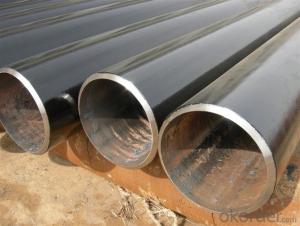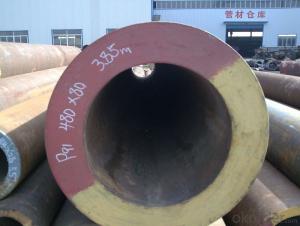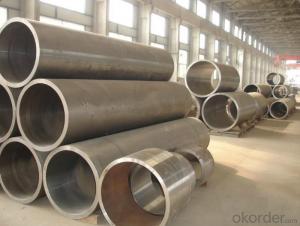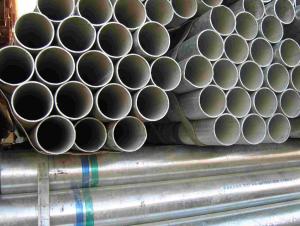Seamless Steel Pipe with High Quality and International Trader
- Loading Port:
- Tianjin
- Payment Terms:
- TT or LC
- Min Order Qty:
- 50 m.t.
- Supply Capability:
- 20000000 m.t./month
OKorder Service Pledge
OKorder Financial Service
You Might Also Like
PRODUCT DETAILS
1.Structure of Seamless Steel Pipe with High Quality and International Trader Description:
A large amount of Seamless Steel Pipes is offered to the clients at cost effective rates. These pipes are extremely durable, resistant to corrosion and have high tensile strength. Our pipes are used in nuclear plants, power plants, refineries and construction industry across the country. Furthermore, we are capable of providing these seamless pipes to the clients in bulk quantity.
2.Main Features of Seamless Steel Pipe with High Quality and International Trader:
• High manufacturing accuracy
• High strength
• Small inertia resistance
• Strong heat dissipation ability
• Good visual effect
•Reasonable price
3.Packaging & Delivery:
| Packaging Details: | Seaworthy packages, bundles wrapped with strong steel strip |
| Delivery Detail: | 15-30 days after received 30% TT |
4.Seamless Steel Pipe with High Quality and International Trader Specification:
| Standard: | GB, DIN, ASTM,ASME, ASTM A106-2006, ASTM A53-2007 |
| Grade: | 10#,20#, 45#, 16Mn |
Thickness: | 8 - 33 mm |
| Section Shape: | Round |
| Outer Diameter: | 133 - 219 mm |
| Place of Origin: | Shandong, China (Mainland) |
| Secondary Or Not: | Non-secondary |
| Application: | Hydraulic Pipe |
| Technique: | Cold Drawn |
| Certification: | API |
| Surface Treatment: | factory state or painted black |
| Special Pipe: | API Pipe |
| Alloy Or Not: | Non-alloy |
| Length: | 5-12M |
| Outer Diameter: | 21.3-610mm |
5.Product pictures
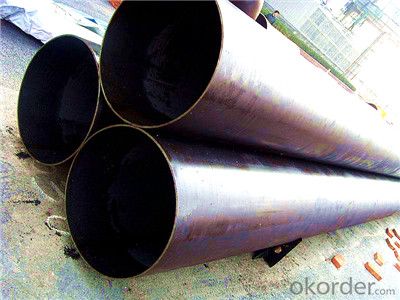
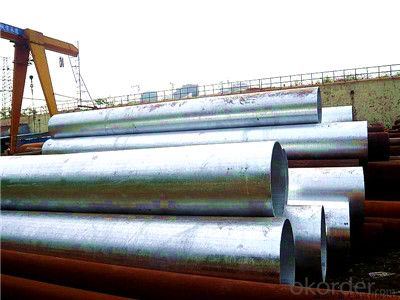
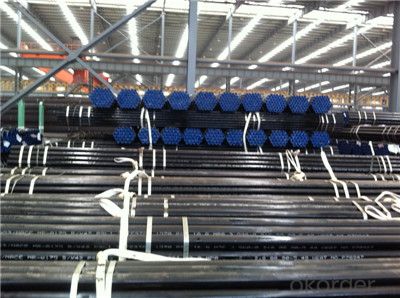
6.FAQ of Seamless Steel Pipe with High Quality and International Trader:
①How is the quality of your products?
Our products are manufactured strictly according to national and internaional standard, and we take a test
on every pipe before delivered out. If you want see our quality certifications and all kinds of testing report, please just ask us for it.
Guaranteed: If products’ quality don’t accord to discription as we give or the promise before you place order, we promise 100% refund.
②How about price?
Yes, we are factory and be able to give you lowest price below market one, and we have a policy that “ for saving time and absolutely honest business attitude, we quote as lowest as possible for any customer, and discount can be given according to quantity”,if you like bargain and factory price is not low enough as you think, just don’t waste your time.Please trust the quotation we would give you, it is professional one.
③Why should you chose us?
Chose happens because of quality, then price, We can give you both.Additionally, we can also offer professional products inquiry, products knowledge train(for agents), smooth goods delivery, exellent customer solution proposals.Our service formula: good quality+good price+good service=customer’s trust.
SGS test is available, customer inspection before shipping is welcome, third party inspection is no problem.
Any question, pls feel free to contact us !
- Q:Are steel pipes suitable for hydronic heating systems?
- Yes, steel pipes are suitable for hydronic heating systems. Steel pipes are known for their durability and strength, making them a reliable choice for transporting hot water or steam in a hydronic heating system. They can withstand high temperatures and pressures, ensuring efficient heat transfer throughout the system. Additionally, steel pipes are resistant to corrosion, which is important in preventing leaks or damage to the pipes over time. However, it is essential to properly insulate steel pipes to minimize heat loss and improve energy efficiency in the hydronic heating system. Overall, steel pipes are a popular and suitable option for hydronic heating systems due to their reliability, durability, and ability to handle the demands of heating water or steam.
- Q:What are the different shapes available for steel pipes?
- There are several different shapes available for steel pipes, including round, square, rectangular, and oval.
- Q:What are the common standards for steel pipe manufacturing?
- Steel pipe manufacturing is regulated by various common standards that guarantee the excellence and uniformity of the products. One of the most renowned standards is the American Society for Testing and Materials (ASTM) standard, which encompasses diverse specifications for different kinds of steel pipes. These specifications encompass dimensions, mechanical properties, and testing prerequisites. Another widespread standard is the American National Standards Institute (ANSI) standard, which establishes directives for the manufacturing procedure, material requirements, and performance attributes of steel pipes. ANSI standards are commonly employed in industrial applications and construction undertakings. Furthermore, international standards such as the International Organization for Standardization (ISO) standard exist, providing guidelines for the design, production, and testing of steel pipes. The ISO standard ensures that steel pipes align with global quality and safety standards. Moreover, specific industries may have their own standards for steel pipe manufacturing. For instance, the American Petroleum Institute (API) has devised standards exclusively for oil and gas industry applications. These standards, like API 5L, outline requirements for the manufacturing, testing, and inspection of steel pipes employed in the transportation of oil and gas. Ultimately, these common standards for steel pipe manufacturing play a vital role in guaranteeing the quality, dependability, and safety of the products. They establish a standardized framework that manufacturers can adhere to, enabling customers to have confidence in the performance and durability of the steel pipes they acquire.
- Q:Where is a steel pipe casing usually used?
- A straight tube of carbon steel sheathed on pipes and tubes and threading tubes to protect the joints from damage by electric welding. The purpose is to protect the wires and cables.
- Q:How are steel pipes used in geothermal energy systems?
- Steel pipes are used in geothermal energy systems to transport the hot water or steam from the underground reservoir to the surface. These pipes are resistant to high temperatures and corrosion, ensuring the safe and efficient transfer of geothermal fluids. Additionally, steel pipes provide durability and strength, making them suitable for the harsh conditions of geothermal environments.
- Q:Can steel pipes be used for airport construction?
- Yes, steel pipes can be used for airport construction. Steel pipes are commonly used in various construction projects due to their durability, strength, and resistance to corrosion. They are capable of withstanding heavy loads and are often used for underground drainage systems, water supply networks, and structural support in airport construction.
- Q:What is the maximum length of steel pipes available?
- The maximum length of steel pipes available can vary depending on the manufacturer and specific application. However, steel pipes can typically be found in lengths ranging from 20 feet (6 meters) to 40 feet (12 meters) or even longer in some cases.
- Q:What are the common uses of stainless steel pipes?
- Various industries widely use stainless steel pipes for numerous purposes. Some common applications of these pipes include: 1. Plumbing and Water Supply: Stainless steel pipes are popularly utilized in residential, commercial, and industrial plumbing systems due to their resistance against corrosion, durability, and capacity to handle high-pressure situations. They are also employed in water treatment plants and wastewater management systems. 2. Oil and Gas Industry: The oil and gas industry extensively relies on stainless steel pipes for the transportation of oil, gas, and other fluids. These pipes can endure high temperatures, pressure, and corrosive environments, making them ideal for this sector. 3. Food and Beverage Industry: The food and beverage industry frequently employs stainless steel pipes because of their hygienic properties and ability to resist corrosion. These pipes are commonly used for the transportation of liquids, gases, and food products in processing plants, breweries, wineries, dairies, and other food-related facilities. 4. Chemical and Petrochemical Industry: Stainless steel pipes play a critical role in the chemical and petrochemical industry, where they are utilized for transporting corrosive chemicals, acids, and other hazardous substances. The pipes' resistance to corrosion and high temperatures makes them suitable for these demanding applications. 5. Construction and Architecture: Stainless steel pipes are utilized in construction and architecture for various purposes such as providing structural support, creating handrails, guardrails, and decorative elements. Their strength, durability, and aesthetic appeal make them a popular choice in contemporary architectural designs. 6. Automotive and Transportation: The automotive industry relies on stainless steel pipes for exhaust systems, fuel lines, and other components that require resistance to high temperatures and corrosion. These pipes are also used in the transportation of fluids and gases in ships, trains, and airplanes. 7. Pharmaceutical Industry: The pharmaceutical industry necessitates high-quality materials that adhere to stringent sanitary standards. Stainless steel pipes are commonly used in pharmaceutical manufacturing processes for transporting liquids, gases, and chemicals due to their cleanability, resistance to corrosion, and compatibility with pharmaceutical products. 8. Power Generation: Stainless steel pipes find applications in power plants, both conventional and renewable, for various purposes such as steam lines, condensers, and heat exchangers. These pipes are selected for their ability to withstand high temperatures, pressure, and corrosive environments. In conclusion, stainless steel pipes have a wide range of applications in various industries, including plumbing, oil and gas, food and beverage, chemical and petrochemical, construction, automotive, pharmaceutical, and power generation. Their resistance to corrosion, durability, and ability to handle high temperatures and pressure make them a versatile and reliable choice for numerous industrial applications.
- Q:How do you calculate the bending moment of a steel pipe?
- To determine the bending moment of a steel pipe, one must take into account both the applied load and the structural characteristics of the pipe. The bending moment quantifies the internal forces within the pipe caused by the applied load. To calculate the bending moment, one can use the following equation: Bending Moment = Load x Distance In this equation, the load represents the external force acting on the pipe, and the distance refers to the separation between the point of load application and the point where the bending moment is being evaluated. For an accurate bending moment calculation, it is necessary to consider the properties of the steel pipe. These properties encompass the pipe's cross-sectional area, second moment of area (also known as the moment of inertia), and the modulus of elasticity. The second moment of area demonstrates the pipe's resistance to bending and can be computed based on the dimensions of the pipe's cross-section. The modulus of elasticity signifies the pipe's stiffness and can be obtained from material properties data. Once the load, distance, cross-sectional area, moment of inertia, and modulus of elasticity are determined, they can be inputted into the bending moment equation to ascertain the bending moment for the steel pipe. It is important to recognize that the calculation of bending moment assumes linear elastic behavior, which implies that the pipe does not surpass its elastic limit nor undergo plastic deformation. If the pipe is exposed to loads surpassing its capacity, the bending moment calculation may not accurately depict the actual behavior of the pipe. In such instances, it is recommended to consult a structural engineer or employ more sophisticated analysis methods to precisely evaluate the bending moment.
- Q:How do steel pipes perform in marine environments?
- Steel pipes perform well in marine environments due to their high corrosion resistance. They are typically coated with protective layers such as zinc or epoxy, which further enhance their ability to withstand the harsh conditions of saltwater, waves, and constant exposure to moisture. These pipes are capable of withstanding the corrosive effects of seawater, making them reliable for various applications like offshore oil rigs, shipbuilding, and coastal infrastructure.
1. Manufacturer Overview |
|
|---|---|
| Location | |
| Year Established | |
| Annual Output Value | |
| Main Markets | |
| Company Certifications | |
2. Manufacturer Certificates |
|
|---|---|
| a) Certification Name | |
| Range | |
| Reference | |
| Validity Period | |
3. Manufacturer Capability |
|
|---|---|
| a)Trade Capacity | |
| Nearest Port | |
| Export Percentage | |
| No.of Employees in Trade Department | |
| Language Spoken: | |
| b)Factory Information | |
| Factory Size: | |
| No. of Production Lines | |
| Contract Manufacturing | |
| Product Price Range | |
Send your message to us
Seamless Steel Pipe with High Quality and International Trader
- Loading Port:
- Tianjin
- Payment Terms:
- TT or LC
- Min Order Qty:
- 50 m.t.
- Supply Capability:
- 20000000 m.t./month
OKorder Service Pledge
OKorder Financial Service
Similar products
New products
Hot products
Hot Searches
Related keywords
